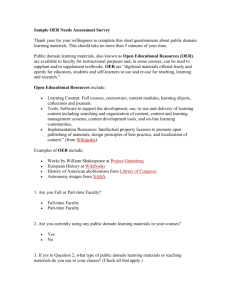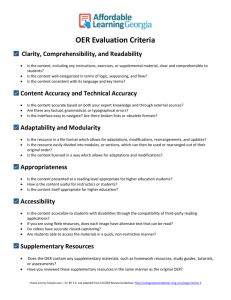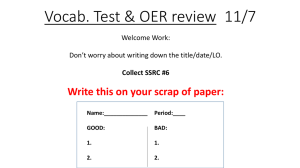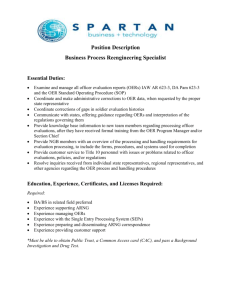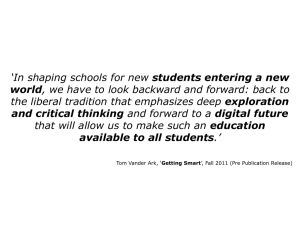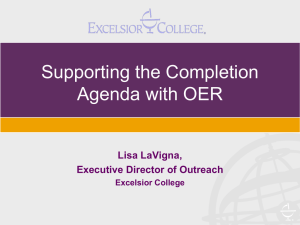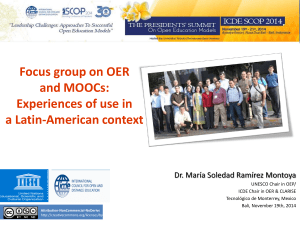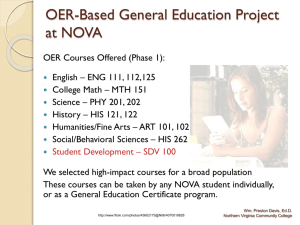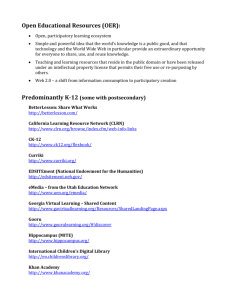141023 Minutes V2 - Library Leadership Council
advertisement
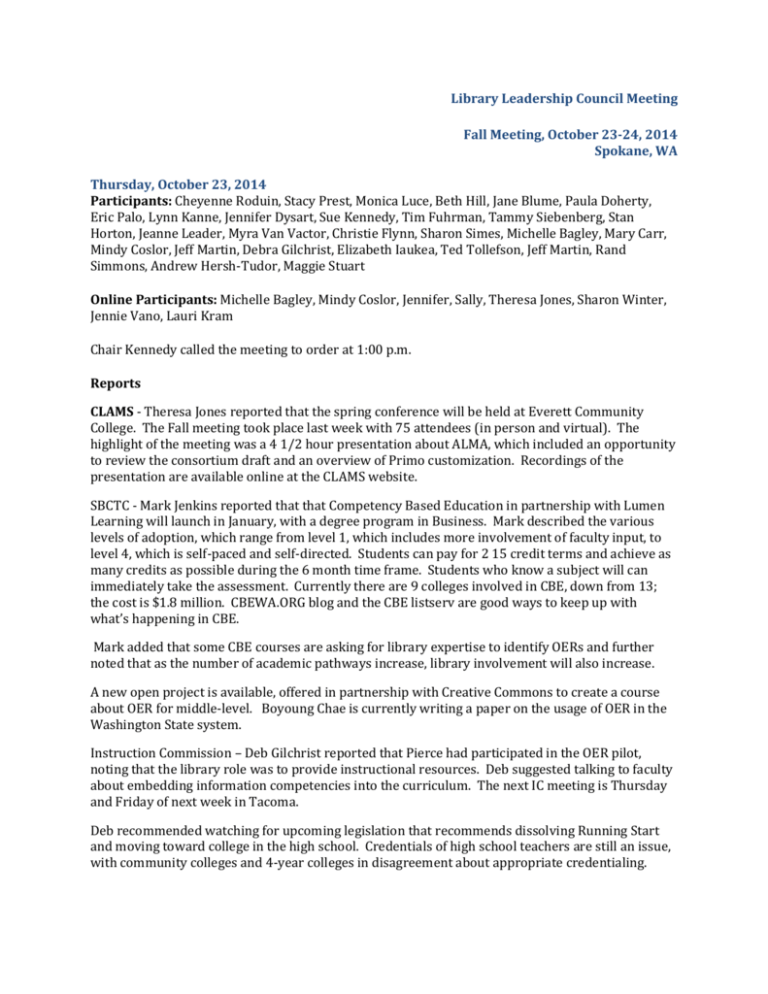
Library Leadership Council Meeting Fall Meeting, October 23-24, 2014 Spokane, WA Thursday, October 23, 2014 Participants: Cheyenne Roduin, Stacy Prest, Monica Luce, Beth Hill, Jane Blume, Paula Doherty, Eric Palo, Lynn Kanne, Jennifer Dysart, Sue Kennedy, Tim Fuhrman, Tammy Siebenberg, Stan Horton, Jeanne Leader, Myra Van Vactor, Christie Flynn, Sharon Simes, Michelle Bagley, Mary Carr, Mindy Coslor, Jeff Martin, Debra Gilchrist, Elizabeth Iaukea, Ted Tollefson, Jeff Martin, Rand Simmons, Andrew Hersh-Tudor, Maggie Stuart Online Participants: Michelle Bagley, Mindy Coslor, Jennifer, Sally, Theresa Jones, Sharon Winter, Jennie Vano, Lauri Kram Chair Kennedy called the meeting to order at 1:00 p.m. Reports CLAMS - Theresa Jones reported that the spring conference will be held at Everett Community College. The Fall meeting took place last week with 75 attendees (in person and virtual). The highlight of the meeting was a 4 1/2 hour presentation about ALMA, which included an opportunity to review the consortium draft and an overview of Primo customization. Recordings of the presentation are available online at the CLAMS website. SBCTC - Mark Jenkins reported that that Competency Based Education in partnership with Lumen Learning will launch in January, with a degree program in Business. Mark described the various levels of adoption, which range from level 1, which includes more involvement of faculty input, to level 4, which is self-paced and self-directed. Students can pay for 2 15 credit terms and achieve as many credits as possible during the 6 month time frame. Students who know a subject will can immediately take the assessment. Currently there are 9 colleges involved in CBE, down from 13; the cost is $1.8 million. CBEWA.ORG blog and the CBE listserv are good ways to keep up with what’s happening in CBE. Mark added that some CBE courses are asking for library expertise to identify OERs and further noted that as the number of academic pathways increase, library involvement will also increase. A new open project is available, offered in partnership with Creative Commons to create a course about OER for middle-level. Boyoung Chae is currently writing a paper on the usage of OER in the Washington State system. Instruction Commission – Deb Gilchrist reported that Pierce had participated in the OER pilot, noting that the library role was to provide instructional resources. Deb suggested talking to faculty about embedding information competencies into the curriculum. The next IC meeting is Thursday and Friday of next week in Tacoma. Deb recommended watching for upcoming legislation that recommends dissolving Running Start and moving toward college in the high school. Credentials of high school teachers are still an issue, with community colleges and 4-year colleges in disagreement about appropriate credentialing. There was a brief discussion about LLC participation in IC. Currently LLC participated in the Tech Committee. A suggestion was made to add a second representative to IC, possibly serving on the either the transfer, work force, or transitions committee. A second alternative would be to have the 1 rep be a “split rep,” serving on two committees. ACTION – Stan Horton made a motion to have two LLC representatives on IC, one on the transfer committee and one on the technology committee. The motion was seconded by Tim Fuhrman. Discussion: it was noted that many of the new adult students will be in Workforce or Transitions. Sue Kennedy amended the motion, to state that LLC will maintain the tech rep and add an at-large rep to IC. Motion carried. Sue will follow up to add the at-large rep to IC. Other news from IC – Libraries with periodicals in excess of $10,000 must rebid each year. eLearning Council – Stan Horton reported that ELC met 2 weeks ago. Issues addressed included a nationwide state authorization compact, the replacement of Tegrity by Panopto, issuing badges inside of Canvas to prove competency mastery, and the requirement on some campuses that all instructors use Canvas. The ELC OER subcommittee reviewed and discussed the LLC OER definition, but did not reach agreement. A suggestion was made to encourage librarians to take Boyoung Chae’s OER course and to become familiar with the OpenWA website. Mark Jenkins added that there will eventually be a Twitter feed on OpenWA to push content. Sue announced that ITC and State Library reports will be presented tomorrow. Sue suggested thinking ahead about the library platform project and the new consortium, as Ted Tollofson will be here to answer questions. MSIT Update – Elizabeth Iaukea from the Washington State Library reported that the legislature has funded vouchers for Microsoft Specialist certification. Some business schools are now requiring this certification for admission. Software site licenses are also offered at a reduced rates. Currently 10,000 are enrolled in MSIT. Group Sessions – the membership broke into 3 discussion groups: 1) library services platform, 2) student outcomes, and 3) advancing the use of OER. Groups discussed the following: 1) goals for the year, 2) opportunities or barriers, 3) questions, and 4) needed resources. The meeting reconvened at 4:00. Alma Implementation – Ted Tollefson answered questions about the Alma implementation and described a variety of available Alma implementation resources, including a recorded Webex, and the CLAMS presentation. Sue will send out start and stop markers for the CLAMS presentation, Ted will provide a bullet sheet with additional information. Work Group Report Outs OER Group Goals – adopt LSTA goals with modifications: 1. Libraries will be OER leaders and advocates 2. ITC will pilot and adopt courses 3. LLC will support OER programming and advocacy through stakeholder collaboration Barriers 1. Bookstore issues 2. shortage of experts 3. financial resources Opportunities 1. Boyoung’s course 2. LSTA Resources 1. SBCTC support: summit, speakers Other topics discussed – avoiding duplication of effort, library in lead role vs support role; discussion should continue in winter and spring. Student Outcomes Group Christie Flynn reported that the group discussed measures of student success. Opportunities 1. Questions on CSSE 2. PILR grant Barriers 1. Variables are different Resources 1. 2. 3. 4. National group ACRL Information literacy Primo may be a tool to measure our success working with faculty The OER group had attended to come up with simple metrics. One suggestion was to use CSSE exclusively, but some colleges don’t use it. Other suggestions included a bibliography, surveys, and a literature review. For winter, may survey colleges to find out who is using the CSSE and how often. Mindy Coslor offered to send out information about how she uses CSSE data. Library Platform Group Goals – determine funding and cost structure, negotiate contract, identify how to move forward, identify a communication plan. Day 1 adjourned at 5:27 p.m. Friday, October 24, 2014 Day 2 convened at 8:33 a.m. Bylaws Changes ACTION: Tim Fuhrman made a motion to change LMDC to LLC and add the duty of new member orientation to the incoming chair. Motion seconded by Beth Hill. Motion carried. LSTA Grant Sharon Winters reported that information about the LSTA Grant is available at the libraryasleader.org website. There is also a wordpress blog, which is intended for a wider audience. Grant participants will have access to a Canvas classroom. The mini grant phase begins next month. 20 mini-grants of $3,000 will be available. Funds will be split between discipline faculty and librarians to adopt OER into coursework. Quill West will lead workshops and drive the project. There will be a LSTA workshop at Tacoma Community College on 11/7/14. Applications are due on 11/20/14. Platform and New Consortium Next week Sue Kennedy and Jennifer Dysart will attend IC to discuss the library platform as a core technology. Jennifer and Andrew Hersch-Tudor previously addressed this topic and WACTC. Currently there are no core technologies and there is no process in place to designate core technologies. WACTC may take the library platform as a test case. IC will discuss core technology and has requested proposals for funding models. A suggestion was made to “laymanize” documentation about the new platform to make it easier for IC members to understand. A second suggestion was made to strongly urge IC to support the core technology recommendation to WACTC. There are now 28-30 colleges who have expressed interest in moving forward with the project. If the platform is designated as a core technology, it will be easier for some schools to take part. There is currently an interest in building an early cohort to start the process in July. Sue distributed a spreadsheet with high-end implementation costs per college. Washington State Library Jeff Martin – the Library Council of Washington has developed their 2015 work plan, which includes three new projects: 1) Library as OER leaders, 2) Washington digital newspapers, and 3) All-aboard for Kindergarten. Rand Simmons reported that there is an expected $2.4 million shortfall in income. The state library is requesting backfill to establish level funding. The library is is requesting an appropriation to provide sustaining funds for MSIT, as the project has only been funded for 2 years. Without the backfill, LSTA funds are subject to reduction, and other services will be at risk. Jane Blume suggested that members write the governor a letter suggesting that more funds be allocated to the state library. Treasurer’s report: Andrew Tudor reported that the current balance is $5,690.66. The full report is posted on the wiki. Michelle Bagley made a motion to approve the report. Motion seconded by Myra Van Vactor. Motion carried. July Minutes: Jeanne Leader made a motion to approve the summer minutes. Motion seconded by Tim Fuhrman. Motion carried. Alma Implementation: Discussion returned to the cost estimate spreadsheet. Sue noted that the cost estimates are based on FTE. A suggestion was made to add time frames to the spreadsheet, indicating which colleges are will be participating in each of the three waves: Year 1, Year 2, or Year 3. Sue informally polled participants about confidence in funding and the level of technical support needed. Jennifer Dysart called for volunteers to take in the negotiations. Consortium: Andrew Hersh-Tudor reviewed the consortium document developed at the summer meeting. Andrew reported that he had discussed the document with CLAMS last week. CLAMS members were interested and engaged. Andrew was able to clear up concerns about additional workload. LLC members proceeded to give input on the document. Suggestions including not using LMS as the acronym for the system as it may be confused with “Learning Management System.” Andrew thanked the group for comments and offered to revise the document. Andrew reported that ExLibris wants the name of the consortium. Andrea has been suing CTCLC, with the final LC standing for “library consortium.” A suggestion was made to expand the ORCA consortium rather than creating a new one, as ORCA is already a legal entity. A lengthy discussion ensued about the merits of creating a new consortium vs. expanding the existing ORCA consortium. The discussion will be continued at the winter meeting. Departures: This is the last meeting for Myra Van Vactor and Paula Doherty. The membership acknowledged them for their many contributions to LLC. The meeting adjourned at 11:57 a.m.
